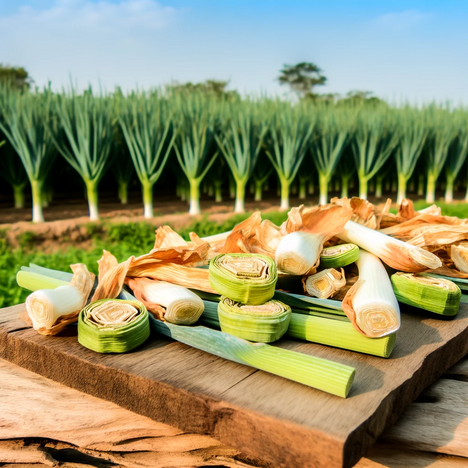Dried leek

Dried leeks, a member of the Allium family and related to onions and garlic, are often used in human cuisine, particularly as a condiment. While the culinary benefits of dried leeks are undisputed, their use in dogs' diets raises questions and concerns. In this article, we look at what dried leeks are and examine the potential pros and cons of using them in a dog's diet.
What is dried leek?
Dried leeks are produced by the drying process of fresh leeks, whereby the water is removed to extend the shelf life and facilitate storage. This process concentrates the flavors as well as the nutrients and chemical compounds contained in leeks.
Benefits of dried leeks
Flavor enhancement
In theory, dried leeks could serve as a flavor enhancer in a dog's diet, similar to human nutrition. A small amount could theoretically help to make the food more palatable for picky eaters.
Nutrient content
Leeks are rich in vitamins such as vitamin A, vitamin C and iron. In dried form, these nutrients could be in a more concentrated form and potentially contribute to the nutrient supply.
Disadvantages and risks
Toxicity
The most important consideration when it comes to dried leeks and dogs is their toxicity. Leeks belong to the Allium family, which also includes onions and garlic. All plants in this family are toxic to dogs and can lead to a condition called hemolytic anemia, which damages the red blood cells.
Signs of poisoning
Symptoms of Allium poisoning in dogs can include nausea, vomiting, diarrhea, lethargy, abdominal pain, and in severe cases, respiratory distress, increased heart rate and collapse. These symptoms can occur immediately or with a delay, depending on the amount ingested.
Long-term health risks
In addition to the immediate symptoms of poisoning, Allium compounds can cause long-term health damage in dogs, including permanent damage to red blood cells and potentially life-threatening conditions.
Although dried leeks are prized in human cuisine for their flavor and nutrients, they are unsuitable for dogs due to the toxic substances they contain. The potential health benefits are far overshadowed by the risks associated with Allium poisoning. It is important that dog owners carefully monitor their pets' diets and avoid dried leeks and other foods that are toxic to dogs. Your dog's health and well-being depends largely on a safe and appropriate diet.
If you notice any signs of hypersensitivity or poisoning in your dog, you should see your vet immediately. We are not a substitute for a vet, but we try to be as accurate as possible. Every dog reacts differently and we recommend you get a second opinion or consult your vet if in doubt.
Stay healthy and take good care of your four-legged friend!😊